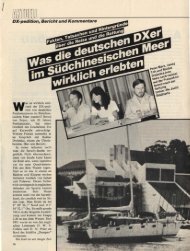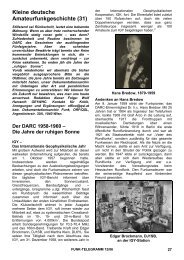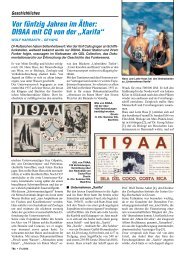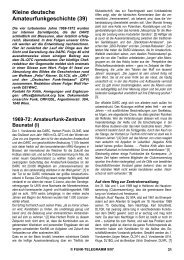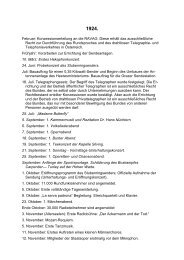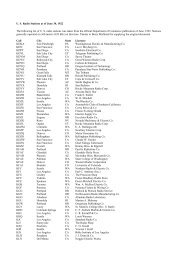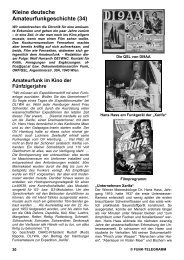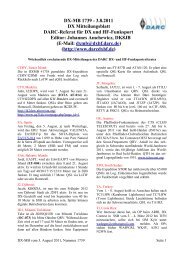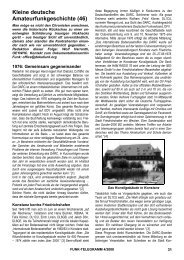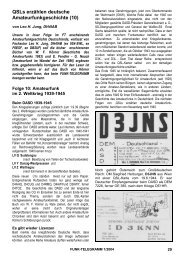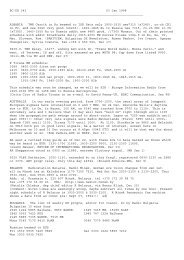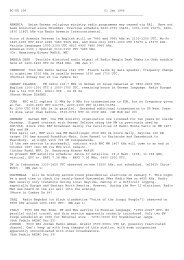- Page 1 and 2:
BC-DX 841 04 Jan 2008 _____________
- Page 3 and 4:
BANGLADESH Bangladesh BETAAR - Ongo
- Page 5 and 6:
(antenna tuning unit needs tuning a
- Page 7 and 8:
In 1999, the govt of Chad liberaliz
- Page 9 and 10:
0700-0800 13695 11700(1) 15300(2) 0
- Page 11 and 12:
T-SYSTEMS (DTK) B07 period (28/10/2
- Page 13 and 14:
9670 2000-2100 37,38 204 195 217 12
- Page 15 and 16:
9880 1900-1959 37,38W 213 210 216 1
- Page 17 and 18:
hat erneut die Bundesnetzagentur ei
- Page 19 and 20:
it's more or less the 8 kW Telefunk
- Page 21 and 22:
No gongs heard until almost 1505; r
- Page 23 and 24:
Available patterns include but are
- Page 25 and 26:
months off). Now he has taken a wel
- Page 27 and 28:
PAPUA NEW GUINEA Well, after so muc
- Page 29 and 30:
the most numerous members of the la
- Page 31 and 32:
Post, Marshland Road, Moorends, Don
- Page 33 and 34:
VIETNAM 9730 VoVTN Hanoi, Russian s
- Page 35 and 36:
ARMENIA MW 1377 at 1700-1800 UT now
- Page 37 and 38:
Not knowing Russian language (excep
- Page 39 and 40:
(Rumen Pankov-BUL, wwdxc BC-DX Jan
- Page 41 and 42:
inserts. Fair signal. 13660, WYFR v
- Page 43 and 44:
12025.00 AIR Hindi/Malayalam sce fr
- Page 45 and 46:
1423.74 Music Radio 1422, Tangerang
- Page 47 and 48:
within our group message area previ
- Page 49 and 50:
1958 and 1959 LAOS, local time agai
- Page 51 and 52:
62.220917&z=16.5&r=0&src=msl> and i
- Page 53 and 54:
annte der Hochspannungstrafo durch
- Page 55 and 56:
ROMANIA/MONACO-FRANCE/AUSTRIA Radio
- Page 57 and 58:
49 mb. (wb, wwdxc BC-DX Jan 5) TAIW
- Page 59 and 60:
admired - BBC engineer Mr. Bernard
- Page 61:
Year? and NatAnthem on 6250, 6399,
- Page 64 and 65:
conditioning, changing out guy-wire
- Page 66 and 67:
5030 ORTB Ouagadougou at 2230 UT mx
- Page 68 and 69:
and thus no doubt the same transmit
- Page 70 and 71:
ECUADOR 4814.99 Radio El Buen Pasto
- Page 72 and 73:
(knapp 30 MB fuer 56 Min. mit 64 kB
- Page 74 and 75:
English under very heavy digital no
- Page 76 and 77:
E5 without realizing they are now o
- Page 78 and 79:
music, French at 1500; 55454. This
- Page 80 and 81:
The decision to revamp the external
- Page 82 and 83:
6075 kHz with classical music. (Ron
- Page 84 and 85:
7200 kHz ist hier in Stuttgart der
- Page 86 and 87:
UNID 5954.15 at 2308 UT. UNIDENTIFI
- Page 88 and 89:
0100-0200 on 15195 TSH 300 kW in Ta
- Page 90 and 91:
mode, and thus assume what you hear
- Page 92 and 93:
delegates from the Asia-Pacific reg
- Page 94 and 95:
BC-DX 844 26 Jan 2008 _____________
- Page 96 and 97:
2008. Please continue to pray for t
- Page 98 and 99:
(Ross Comeau-MA-USA, DXplorer Jan 2
- Page 100 and 101:
the 0330 UT listed in EMWG and WRTH
- Page 102 and 103:
incoming audio circuit, then they w
- Page 104 and 105:
irregular although Latin Harmonic i
- Page 106 and 107:
area last week and there was good r
- Page 108 and 109:
hear R. Moldova also on 1494 kHz. (
- Page 110 and 111:
This may please be noted for the fu
- Page 112 and 113:
POR RDP Covilha Antena-1 666 10 kW
- Page 114 and 115:
RRI-Bukarest erwaehnte am Sonntag (
- Page 116 and 117:
TAJIKISTAN 972 MW, Orzu radiates a
- Page 118 and 119:
(Scott Fybush-USA, NE Radio Watch J
- Page 120 and 121:
and Radio Voice of the People follo
- Page 122 and 123:
The Algerian government began the r
- Page 124 and 125:
1700-1730 on 7335 ARM 100 kW / 188
- Page 126 and 127:
and Zadar 2x600kW od 1986 (wb,
- Page 128 and 129:
1300-1400 on 15370 13760 13680 1200
- Page 130 and 131:
At my location these frequencies ar
- Page 132 and 133:
6334.97 Reception of Kurdish statio
- Page 134 and 135:
0459-1058 9870 RAN 050 kW 000 deg D
- Page 136 and 137:
meantime, in 2008 the external serv
- Page 138 and 139:
Agency-M' via FTVP. Full data (w/ s
- Page 140 and 141:
RWANDA/MADAGASCAR 9590 at 1600-1657
- Page 142 and 143:
176517/bild-i144441> but seems dism
- Page 144 and 145:
natural Radio Maiak from Russian tr
- Page 146 and 147:
Die VoR aus MDA auf 6240 kHz fast m
- Page 148 and 149:
us visiting several sights in north
- Page 150 and 151:
location! Thanks again, and I hope
- Page 152 and 153:
BC-DX 846 09 Feb 2008 _____________
- Page 154 and 155:
1730-1800 NF 9590 KIG 250 kW / 030
- Page 156 and 157:
kHz, 1620 UT. (wb, wwdxc BC-DX TopN
- Page 158 and 159:
(Mike Barraclough-UK, dxld Feb 7) N
- Page 160 and 161:
(Glenn Hauser-OK-USA, dxld Feb 5) E
- Page 162 and 163:
tube exhausted, sort out". (Kai Lud
- Page 164 and 165:
Depends which of the txs at Sirjan
- Page 166 and 167:
from the material posted at (which
- Page 168 and 169:
applies. This is nonsensical, but I
- Page 170 and 171:
Nach 69 Jahren ist Schluss: Die hal
- Page 172 and 173:
USA/GERMANY Studio DX in Italian is
- Page 174 and 175:
BC-DX 847 16 Feb 2008 _____________
- Page 176 and 177:
preacher. Weak. Poor with QRM from
- Page 178 and 179:
underneath // v7175. So, not sure i
- Page 180 and 181:
1900-1930 9760 WER 100 kW 120 deg t
- Page 182 and 183:
translate these documents into Engl
- Page 184 and 185:
wooden registration? wb.], . Not of
- Page 186 and 187:
UKRAINE 11530 V. of Mesopotamia on
- Page 188 and 189:
means of a diplexer arrangement tha
- Page 190 and 191:
BC-DX 848 23 Feb 2008 _____________
- Page 192 and 193:
CHINA 7375 CNR-2/China Business Rad
- Page 194 and 195:
# co-ch VOR in Aracic till 2000 and
- Page 196 and 197:
2000-2100 9670 WER 125 kW 195 deg F
- Page 198 and 199:
7245 ORTM (tent), at 0848-0901 UT o
- Page 200 and 201:
February. The reason is the station
- Page 202 and 203:
Albanian 1600-1630 1548 Grigoriopol
- Page 204 and 205:
0200-0700 801 Dushanbe 1000 Near an
- Page 206 and 207:
[Megawatt tx which should be payed
- Page 208 and 209:
using that channel from Briech. (wb
- Page 210 and 211:
BC-DX 849 01 Mar 2008 _____________
- Page 212 and 213:
9525 0700-0800 ASC 250kW 27deg ASCE
- Page 214 and 215:
ough location details including arc
- Page 216 and 217:
just above weak level, but distinct
- Page 218 and 219:
Writing off DRM seems to be done on
- Page 220 and 221:
Bei einem Besuch in Aethiopien samm
- Page 222 and 223:
[later] Of course, it is French - i
- Page 224 and 225:
0900-1055 9895 NAU 250 kW 255 deg S
- Page 226 and 227:
dokumentiert die Zugehoerigkeit zur
- Page 228 and 229:
JAPAN [and non] 648 AFN Okinawa to
- Page 230 and 231:
6200...6300 range by the Lithuanian
- Page 232 and 233:
(wb, Feb 24) 7540 Turkish? jammer o
- Page 234 and 235:
6195 Re this message from Martien I
- Page 236 and 237:
4970 AIR Shillong 1230 4975 poor re
- Page 238 and 239:
For example, you can choose one QSL
- Page 240 and 241:
#*#*#**#*#*#*#*#*#*#*#*#*#*#*#*#*#*
- Page 242 and 243:
JCIC is an enforcement group of Fur
- Page 244 and 245:
15515 DRM, Vatican Radio, 03/06/08,
- Page 246 and 247:
15605 1600 1700 38E,47E,48,ISS 500
- Page 248 and 249:
That's what I meant: is the same a
- Page 250 and 251:
1450 kms distance to central KRE, i
- Page 252 and 253:
6160drm Kvitsoe 65 kW 220degrees ma
- Page 254 and 255:
The area where the station left its
- Page 256 and 257:
Updates and information regarding t
- Page 258 and 259:
good long-wire aerial about 50 feet
- Page 260 and 261:
TCI antenna from Croatia ? Wolfgang
- Page 262 and 263:
(Wolf Hadel-D DK2OM, wwdxc BC-DX To
- Page 264 and 265:
pretty good on this QRG. 6170 was a
- Page 266 and 267:
9450 [POLAND] Polskie Radio via Wer
- Page 268 and 269:
sign on with Arabic talk. Short bre
- Page 270 and 271:
21705 Main prgr - clearly and stron
- Page 272 and 273:
DIGITAL DATA TRANSMISSION with late
- Page 274 and 275:
BC-DX 852 21 Mar 2008 _____________
- Page 276 and 277:
Problems with Radio Nacional Faro (
- Page 278 and 279:
was almost certainly R. Alvorada. (
- Page 280 and 281:
0600-0630 -daily- West Europe 7200
- Page 282 and 283:
COSTA RICA Scott, most probably wha
- Page 284 and 285:
2300 0230 11920 250 126 Brazil 1111
- Page 286 and 287:
(wb Mar 14) Freq. changes of Trans
- Page 288 and 289:
As it seems that RTE is celebrating
- Page 290 and 291:
(Colin Miller-CAN VE3CMT, SW DX sit
- Page 292 and 293:
[Presenter] The minister of informa
- Page 294 and 295:
0130-0200 daily SeA 15290 TWN 250 0
- Page 296 and 297:
I need to thank Mauno for alerting
- Page 298 and 299:
energy consumption could be of the
- Page 300 and 301:
through a warehouse roof. Other tha
- Page 302 and 303:
the exceptions I know about. J. R.
- Page 304 and 305:
BC-DX 853 27 Mar 2008 _____________
- Page 306 and 307:
History: In 1801 Captain Nicholas B
- Page 308 and 309:
December 1967. From 1967 the VLF st
- Page 310 and 311:
TRANS WORLD RADIO - CAPE GRECO, CYP
- Page 312 and 313:
Marco, wahrscheinlich Wavre-BEL mit
- Page 314 and 315:
noch einige deutsche Brocken in die
- Page 316 and 317:
5009.78 Radio Cristal Internacional
- Page 318 and 319:
(Ian Baxter-AUS, SW TXsite Mar 21)
- Page 320 and 321:
Kashi in Russian til 1657 UT cl-dow
- Page 322 and 323:
language broadcasts, including Engl
- Page 324 and 325:
0900-1000 15160 0900-1100 7275 9570
- Page 326 and 327:
6020. AWR via Talata V.: Local serv
- Page 328 and 329:
Naswa-Biafraland. If indeed back on
- Page 330 and 331:
UKRAINIAN 1500-1530 7210 1700-1730
- Page 332 and 333:
First Programme An evening slot at
- Page 334 and 335:
A-08 Kvitsoe-NOR 500 kW 155 degr BB
- Page 336 and 337:
CP in Oregon. They have been regist
- Page 338 and 339:
ARMENIA/EGYPT/USA 15710 mess. Three
- Page 340 and 341:
Saturday 1630-1700 Arabic 9430 Wert
- Page 342 and 343:
Thursday 1530-1600 Hindi 15390 Naue
- Page 344 and 345:
interference of strong CNR1 on 6030
- Page 346 and 347:
Ge, Sp 1900, 2000 Fr, En 2115-2245
- Page 348 and 349:
7320 0000-0100 41 105 216 WER 250 I
- Page 350 and 351:
9610 1900-2200 46,47,52 180 218 WER
- Page 352 and 353:
EMG Evangelische Missions Gemeinden
- Page 354 and 355:
0900 0930 11645 Ge 0930 1000 11645
- Page 356 and 357:
HONDURAS 3340.03 HRMI R. MI, Comaya
- Page 358 and 359:
ENGLISH 1030 1130 15600 41 ENGLISH
- Page 360 and 361:
UZBAKI 1500 1600 5945 30S,31S,40NE
- Page 362 and 363:
MADAGASCAR/BONAIRE IBB relays via R
- Page 364 and 365:
(Mark Nicholls-NZL, Chief Editor Ne
- Page 366 and 367:
1800-1826 7130* till Sep.6 1800-182
- Page 368 and 369:
] 7290 1800-2000 UTC Fri,Sat,Sun to
- Page 370 and 371:
1300 1330 15325 250 135East Africa
- Page 372 and 373:
BBC relaying transmitter is located
- Page 374 and 375:
Modern Bletchley Park. Nowadays, Bl
- Page 376 and 377:
11785 CRI Cerrik in Ch and En, stil
- Page 378 and 379:
What caused this mess? It was known
- Page 380 and 381:
always be one kHz low in frequency.
- Page 382 and 383:
well, but this would need to be fig
- Page 384 and 385:
treated for minor shock, smoke inha
- Page 386 and 387:
in der Regionalen Zeitung des Kstow
- Page 388 and 389:
Borujerdi (House) Kashana card in 9
- Page 390 and 391:
ITU Nuevo listado de monitoreo de l
- Page 392 and 393:
JSR Shiokaze 1400-1430 6020 (Japane
- Page 394 and 395:
Mayotte" - a gift to my wife 'cause
- Page 396 and 397:
0900-1215 UT 7265 kHz via Islamabad
- Page 398 and 399:
hear the programme clearly, with an
- Page 400 and 401:
TANZANIA [ZANZIBAR] UNIDENTIFIED 60
- Page 402 and 403:
2300-0000 7540 , 11760TIN, 11785TIN
- Page 404 and 405:
6026.37 IRAN IRIB Tehran in Arabic
- Page 406 and 407:
11945 RA in En, signal S=5-6, but v
- Page 408 and 409:
BC-DX 856 19 Apr 2008 _____________
- Page 410 and 411:
17785 2200 2400 SHP 070 100 17795 2
- Page 412 and 413:
11785, 11805, 11825, 11840 12040, 1
- Page 414 and 415:
EL SALVADOR [and non] This weekend
- Page 416 and 417:
pop music. Amharic talk. Very weak.
- Page 418 and 419:
DLF Donebach 153 kHz transmitter OF
- Page 420 and 421:
JAPAN/KOREA QSL JSR Shortwave Shiok
- Page 422 and 423:
DRM SERVICE - A DRM Capable Receive
- Page 424 and 425:
(via Arnaldo Slaen-ARG, DXplorer Ap
- Page 426 and 427:
Burnaston Lane MF 52 52 46.49 N 01
- Page 428 and 429:
Organization: Swedish DX Federation
- Page 430 and 431:
Am Freitag dem 2.5.08 besucht der R
- Page 432 and 433:
equipped with "Tyler Circuit" waves
- Page 434 and 435:
0757-1356 on 9830 DEA 100 kW / non-
- Page 436 and 437:
1630 UT war Asmara auf 5100 gerade
- Page 438 and 439:
Gestern war uebrigens Messtermin mi
- Page 440 and 441:
5830 kHz instead of 9345 kHz effect
- Page 442 and 443:
PAPUA NEW GUINEA 7324.96 Wantok Rad
- Page 444 and 445:
1100-1200 15545 15545 Moscow 250 Eu
- Page 446 and 447:
0100-0200 7125 7125 Chisinau-MDA 50
- Page 448 and 449:
1500-1600 7305 7305 Krasnodar 100 N
- Page 450 and 451:
1200-1300 585 585 Blagoveschensk 12
- Page 452 and 453:
0100-0200 1314 1314 Yerevan-ARM 100
- Page 454 and 455:
1600-1700 1026 1026 Novosibirsk 500
- Page 456 and 457:
0300-0400 9665 9665 Chisinau-MDA 50
- Page 458 and 459:
2330-2358 on 6185%BIJ 250 kW / 310
- Page 460 and 461:
surplus equipment, please email Bob
- Page 462 and 463:
BC-DX 858 01 May 2008 _____________
- Page 464 and 465:
from 1 May 2008. New times PORTUGUE
- Page 466 and 467:
CANADA 6160 CKZN, St. John's NF, 22
- Page 468 and 469:
Kunming. And isn't it quite likely
- Page 470 and 471:
9925 Nauen 100 kW 320 degr zones 2-
- Page 472 and 473:
Funny, I and also Vaeinoe Lehtorant
- Page 474 and 475:
5955 1059-1157 18,27,28W 0 23456 30
- Page 476 and 477:
9895 0759-1057 27S,37N,2 210 17 300
- Page 478 and 479:
15470 1430-1529 47,48 145 123457 JU
- Page 480 and 481:
angle of 32 degrees in the horizont
- Page 482 and 483:
2200-0400 UT 657 900 567 kHz Europa
- Page 484 and 485:
* Radio Free Chosun 1200-1300 15755
- Page 486 and 487:
one, 9635, they mention 7285 & 1196
- Page 488 and 489:
At 0000 UT on 5915 // 5985.75 kHz B
- Page 490 and 491:
43 21 02.90 N 132 10 01.54 E RUS Da
- Page 492 and 493:
51 11 36.28 N 00 12 01.09 W Exeter
- Page 494 and 495:
BC-DX 859 08 May 2008 _____________
- Page 496 and 497:
5995 kHz 1100-1200 UT bearing 010 d
- Page 498 and 499:
25332. 5045 R. Globo-Santos, Presid
- Page 500 and 501:
etween them, with overhead power li
- Page 502 and 503:
6860 R. Cairo 2143 Found on this od
- Page 504 and 505:
(Rumen Pankov-BUL, Sony 2001D, May
- Page 506 and 507:
In spite of recent penetration by o
- Page 508 and 509:
1800 French 7100 11910 SAf 1800 Fre
- Page 510 and 511:
unlisted fqs of 87.6 & 96.7 MHz. (C
- Page 512 and 513:
cancelled from the 1st of May. (Vad
- Page 514 and 515:
0025-0040 Urdu 9650 Mo Th 0025-0040
- Page 516 and 517:
vy73 de Wolfgang DF5SX ***END
- Page 518 and 519:
* co-ch KTWR and Radio Pakistan Fre
- Page 520 and 521:
7270 Nei Menggu PBS (tent), Hohhot,
- Page 522 and 523:
Abis MW 774 kHz 1000 kW 31 08 03.91
- Page 524 and 525:
ETHIOPIA 9704.19 Radio Ethiopia, 03
- Page 526 and 527:
576/200 kW 1 tall MW mast, 20 [form
- Page 528 and 529:
Interestingly Uganda on 4976 kHz is
- Page 530 and 531:
(Jari Savolainen-FIN, DXplorer May
- Page 532 and 533:
9690 0545-0700 30 SAM 250 60 30 Rus
- Page 534 and 535:
And the unofficial sked: additional
- Page 536 and 537:
R Ukraine Int: World of Radio: Wo
- Page 538 and 539:
- please don't hesitate to contribu
- Page 540 and 541:
1000-1100 on 7245 K/A 100 kW / 178
- Page 542 and 543:
Mexican music, 0023 Spanish talk. A
- Page 544 and 545:
PBS services, broadcasting from the
- Page 546 and 547:
Jetzt um 2035 UT natuerlich Radio T
- Page 548 and 549:
17 20 16.36 N 78 33 35.58 E Imph
- Page 550 and 551:
Broadcasting is building a new shor
- Page 552 and 553:
27 00 14.14 N 85 54 12.41 E Dhanku
- Page 554 and 555:
interactive programmes. A few month
- Page 556 and 557:
Khuzdar 567 kHz 300 kW ?? 27 48 20.
- Page 558 and 559:
(Celio Romais, Panorama, @tividade
- Page 560 and 561:
ROU Isaccea 720 kHz 14 kW ??? 45 16
- Page 562 and 563:
12025 0930-1030 500 RFI 12035* 2200
- Page 564 and 565:
IBR - IBRA Radio MEZ - Voice of Mes
- Page 566 and 567:
24 04 44.73 N 120 32 54.28 E y
- Page 568 and 569:
El ingeniero Luis Alfredo Palacios,
- Page 570 and 571:
BC-DX 862 29 May 2008 _____________
- Page 572 and 573:
ut rather sure the other station is
- Page 574 and 575:
(R BULGARIA DX MIX News, Ivo Ivanov
- Page 576 and 577:
13570 / 162 deg CeEaAf - 13670 / 19
- Page 578 and 579:
Der DLF kuendigte zwar den Ausfall
- Page 580 and 581:
India, the Middle East and South Am
- Page 582 and 583:
(wb, wwdxc BC-DX TopNews May 26/28)
- Page 584 and 585:
other functioning on 13-26 MHz comp
- Page 586 and 587:
Morning broadcast SW3: No Changes E
- Page 588 and 589:
UTC/GMT Offset Standard time zone:
- Page 590 and 591:
BC-DX 863 5 June 2008 _____________
- Page 592 and 593:
HKG formerly BBC East Asian Relay s
- Page 594 and 595:
Algier is unfit to provide such a h
- Page 596 and 597:
Greek on 9420 powerhouse, and 9935
- Page 598 and 599:
generators of one megawatt each to
- Page 600 and 601:
are English to 0730, Kadazan 0730-1
- Page 602 and 603:
still a puzzle ??? Choybalsan 1350
- Page 604 and 605:
ahead at midnight between on May 31
- Page 606 and 607:
The country's industrial zones will
- Page 608 and 609:
[to KOREAs] 11640 V of Wilderness [
- Page 610 and 611:
and BBC Kranji next door and stree
- Page 612 and 613:
SRI LANKA 873 SLBC Stopped the MW T
- Page 614 and 615:
have reported it a number of times
- Page 616 and 617:
SW service 1300-1400 (ex-1400-1500)
- Page 618 and 619:
Deewa Radio in Pashto from June 1:
- Page 620 and 621:
BC-DX 864 12 June 2008 ____________
- Page 622 and 623:
BRAZIL 1956 11925.15 ZYE958 R. Band
- Page 624 and 625:
They were also on 14050, 14090 and
- Page 626 and 627:
adjt. QRM. (Carlos Goncalves-POR, w
- Page 628 and 629:
1430-1515 UT*Urdu broadcasts will c
- Page 630 and 631:
AZERI 0330-0527 13710 1430-1657 620
- Page 632 and 633:
provide radio broadcasts for the IB
- Page 634 and 635:
29 30 47 N 47 40 23 E (Ian Baxter-A
- Page 636 and 637:
YUG too] 1400-1500 UT 5955 kHz 190
- Page 638 and 639:
TAJIKISTAN 4635.05 Tajik R. May 25
- Page 640 and 641:
1200-1300 on 7445 UDO, 9310 KWT, 93
- Page 642 and 643:
***END
- Page 644 and 645:
either 9390 or 9400. Signal strengt
- Page 646 and 647:
AUT/US Sender Rot-Weiss-Rot Vien
- Page 648 and 649:
Liberty. Covered by strong noise ja
- Page 650 and 651:
d'une direction a une autre se fait
- Page 652 and 653:
(wb, wwdxc BC-DX TopNews June 18/19
- Page 654 and 655:
(Brian Alexander-PA-USA, DXplorer J
- Page 656 and 657:
DRM SERVICE - A DRM Capable Receive
- Page 658 and 659:
34 21 51.61 N 73 27 48.84 E Islama
- Page 660 and 661:
1930-2000 on 6065 Swedish to Eu/Af/
- Page 662 and 663:
UAE IRIN via Al Dhabbaya. 13685 kHz
- Page 664 and 665:
(Ron Howard-CA-USA, dxld June 14) Y
- Page 666 and 667:
7217 RNA Canal "A" (?), Mulenvos, 2
- Page 668 and 669:
4865 R. Alvorada (pres), Londrina P
- Page 670 and 671:
(dedicated to truck drivers); 34443
- Page 672 and 673:
6250 RNGE/R. Malabo, Malabo, 1300-1
- Page 674 and 675:
Third tx on air again on Friday Jun
- Page 676 and 677:
MONGOLIA 12085 VoMongolia, Khonkhor
- Page 678 and 679:
4770 R. Nigeria, Kaduna, 1434-...,
- Page 680 and 681:
Good signal after 1120, but ragged
- Page 682 and 683:
Responding to my reception report K
- Page 684 and 685:
and ceased sometimes when BBC stopp
- Page 686 and 687:
NORTH INDIA, NEPAL, TIBET 0015-0030
- Page 688 and 689:
19-21 UTC, 6175 [DTK] 6 pm-midnight
- Page 690 and 691:
Programm in Englisch, dem bis 0130
- Page 692 and 693:
probes. Appointments are announced
- Page 694 and 695:
BC-DX 867 03 July 2008 ____________
- Page 696 and 697:
The Radio Moscow relay station that
- Page 698 and 699:
Inlandsprogramm HR2 in den Sommermo
- Page 700 and 701:
GERMANY Sunday, June 29, 2008. Med
- Page 702 and 703:
EURO 2008 football special transmis
- Page 704 and 705:
MW Bernburg. Die heute fuer UKW-Sen
- Page 706 and 707:
Dibrugarh 567 kHz 27 21 59.04 N 94
- Page 708 and 709:
Munsan AFN 576 kHz 37 52 10 N 126 4
- Page 710 and 711:
more talk than yesterday. And I agr
- Page 712 and 713:
talks, local songs, IDs in French,.
- Page 714 and 715:
first time I have heard a transmitt
- Page 716 and 717:
former SUI Mt. Ceneri Cima di Dentr
- Page 718 and 719:
(Patrick Robic-AUT, July 1) THAILAN
- Page 720 and 721:
period between 2008/09 and 2010/11,
- Page 722 and 723:
1500-1600 on 11655 ARM 300 kW / 110
- Page 724 and 725:
land villagers in trouble. "They ha
- Page 726 and 727:
und ich viel Papier in Form der wir
- Page 728 and 729:
***END
- Page 730 and 731:
also some UNID like 18990 unid 1848
- Page 732 and 733:
talks at 1255, youth's musical prgr
- Page 734 and 735:
Ras'Gharib 1188 kHz 1 kW / 1422 kHz
- Page 736 and 737:
well on June 6: Local press repor
- Page 738 and 739:
AFN Grafenwoehr and Vilseck low res
- Page 740 and 741:
VOI reception here in the morning h
- Page 742 and 743:
MALI Da R. Mali um 0800 auf 7284.4
- Page 744 and 745:
empire site at BRM Yangoon Yegu sit
- Page 746 and 747:
1700 when rated 25343 & improving;
- Page 748 and 749:
tx 53 16 20.63 N 50 14 37.82 E / ma
- Page 750 and 751:
Possibly 13 47 44 N 100 31 06 E (st
- Page 752 and 753:
less than the "huge boondoggle" of
- Page 754 and 755:
9505 0504-0700 SPAN 222 9505 0700-0
- Page 756 and 757:
18930 2100-2245 ARAB 44 18980 1400-
- Page 758 and 759:
PORT 0100-0145 7520 142 PORT 0800-1
- Page 760 and 761:
(Alan Davies-Chiang Mai-THA, wb, SW
- Page 762 and 763:
transmitter is right on 4950 kHz. (
- Page 764 and 765:
CHINA Google Earth imagery. Some hi
- Page 766 and 767:
1485 kHz AFN Ansbach mediumwave cha
- Page 768 and 769:
(wb, wwdxc BC-DX TopNews July 12) 4
- Page 770 and 771:
JORDAN Google Earth imagery. Some h
- Page 772 and 773:
19741991> (Kai Ludwig-D, wwdxc BC-D
- Page 774 and 775:
14285 [and 16625] -- Tbilisskaya si
- Page 776 and 777:
1978. 33 30 30.44 N 36 06 57.94 E
- Page 778 and 779:
same figures - ex-13785, due of MSK
- Page 780 and 781:
Indikator in Europa genutzt werden:
- Page 782 and 783:
All conference activities are in En
- Page 784 and 785:
era Over the Horizon Radar, located
- Page 786 and 787:
12080 BBC, Brandon QLD (10 kW), 221
- Page 788 and 789:
Also planned on 11750 kHz in 25 mb
- Page 790 and 791:
CRO Hvar Mala Grcka 774 kHz 50/10 k
- Page 792 and 793:
this time it was the final closure,
- Page 794 and 795:
NDB sender ? 47 22
- Page 796 and 797:
(wb, July 20) Thanks Jean-Michel, T
- Page 798 and 799:
this is their Minorities and Educat
- Page 800 and 801:
13%C2%B034%2731.46%22E&ie=UTF8&ll=4
- Page 802 and 803:
UNIDENTIFIED. Checking 5050, for th
- Page 804 and 805:
1800-1900 on 13720 SKN 300 kW / 140
- Page 806 and 807:
Voice of Meselina Delina 1800-1830
- Page 808 and 809:
Meanwhile, a few blocks away at VOA
- Page 810 and 811:
BC-DX 871 31 July 2008 ____________
- Page 812 and 813:
China, third longest in the world),
- Page 814 and 815:
INDIA 4800 AIR, Hyderabad, 0047-...
- Page 816 and 817:
(Lutz Andreas-D, A-DX July 25) RNZI
- Page 818 and 819:
listeners to hear their views on th
- Page 820 and 821:
ITU 06 17 W 36 31 N Granada, Cullar
- Page 822 and 823:
15745 kHz) only Gospel progrs in En
- Page 824 and 825:
27 July 2008 A-08 RFA Daily Broadca
- Page 826 and 827:
BC-DX 872 07 Aug 2008 _____________
- Page 828 and 829:
04.30-05.00 und 17.40-18.20 Uhr sin
- Page 830 and 831:
Koordinierungsverfahren deuten auf
- Page 832 and 833:
(wb, wwdxc BC-DX TopNews Aug 4) KUW
- Page 834 and 835:
Jedynka uebertraegt jetzt zeitverse
- Page 836 and 837:
Hoehe von 330 bzw. 289 Metern. Dies
- Page 838 and 839:
SERBIAN 1730-1756 6105* ITALIAN 180
- Page 840 and 841:
I checked out a number of RRI trans
- Page 842 and 843:
Nuestro correo electronico: o bien
- Page 844 and 845:
Although is terminated, you CAN ST
- Page 846 and 847:
The transmitter, call sign 5XX, wen
- Page 848 and 849:
Gayle Van Horn W4GVH, Teak Publishi
- Page 850 and 851:
BC-DX 873 13 Aug 2008 _____________
- Page 852 and 853:
It also works for RA Shepparton; ju
- Page 854 and 855:
Taragon Str Hoyland str Bracken
- Page 856 and 857:
phone conversation, pop songs, IDs
- Page 858 and 859:
(Carlos Goncalves-POR, wwdxc BC-DX
- Page 860 and 861:
kiloHertz with the 160 degrees beam
- Page 862 and 863:
planned for the beginning of Octobe
- Page 864 and 865:
Missionswerke Arche Stimme des Tros
- Page 866 and 867:
to South Asia 0030-0100 9490 WER 25
- Page 868 and 869:
(wb, wwdxc BC-DX TopNews Aug 10) QR
- Page 870 and 871:
Die Antennen, Stromversorgung und Z
- Page 872 and 873:
ARABIC 0630-0656 9700# 11730# 9685
- Page 874 and 875:
Could not determine which one was o
- Page 876 and 877:
11665 0200-0600 40,41NW DHA 250kW 4
- Page 878 and 879:
#*#*#*#*#*#*#*#*#*#*#*#*#*#*#*#*#*#
- Page 880 and 881:
power indications there! Some time
- Page 882 and 883:
5025 VL8K, Katherine NT, 2136-2150,
- Page 884 and 885:
9750 Nei Menggu PBS 1338-1401+ Aug
- Page 886 and 887:
Mediumwave Clandestine station Radi
- Page 888 and 889:
In order to dedicate more time to m
- Page 890 and 891:
You can find the active MEDIA BROAD
- Page 892 and 893:
propaganda/clandestine station clos
- Page 894 and 895:
Clearly not // to 6130 till just be
- Page 896 and 897:
But not streams, only podcasts, als
- Page 898 and 899:
Resulting service cancelations: 160
- Page 900 and 901:
podele%20FM%20i%20TV.pdf> [file is
- Page 902 and 903:
itrate transmission, and easy integ
- Page 904 and 905:
the first broadcast of the Voice of
- Page 906 and 907:
plus/minus 148 kHz. (Glenn Hauser-O
- Page 908 and 909:
BC-DX 875 29 Aug 2008 _____________
- Page 910 and 911:
0200-0230 NF 9895 CYP 300 kW 081 de
- Page 912 and 913:
ecordings you hear in the backgroun
- Page 914 and 915:
It is said that attempts had been m
- Page 916 and 917:
Presented in the first of these pho
- Page 918 and 919:
VoINS stream Livestream 128 kb/s
- Page 920 and 921:
completely by CODAR interference. A
- Page 922 and 923:
Kaitaia-Waipapakauri 837/1026: 35 0
- Page 924 and 925:
he spoke on the Voice of Russia tha
- Page 926 and 927: 1098 TWN RT, Kohu; "This is Radio T
- Page 928 and 929: stand, in Hall 5.3, booth 15. There
- Page 930 and 931: And the only new DRM receiver they
- Page 932 and 933: In a sense, Abhazia and SoOssetia h
- Page 934 and 935: eamed to South Africa, Indonesia, a
- Page 936 and 937: Timelines Year Date Event Reference
- Page 938 and 939: ORF 6155 0500-2200, 13730 0600-1800
- Page 940 and 941: COLOMBIA Rafael Rodriguez, La Vox d
- Page 942 and 943: EGYPT Starting last Friday Aug 29 a
- Page 944 and 945: auslaendische Stationen, wie es bei
- Page 946 and 947: Ausflugsgastgaststaette des Fichtel
- Page 948 and 949: sorgt ausserdem ein 10 kW-Kurzwelle
- Page 950 and 951: (probably irregular). I received it
- Page 952 and 953: OM talks, long pause, YL talks, mus
- Page 954 and 955: Now known as Radio New Zealand Inte
- Page 956 and 957: Some changes for Voice of Russia ef
- Page 958 and 959: pattern with a lobe directed toward
- Page 960 and 961: us informed. Thank you for your kin
- Page 962 and 963: PERSIAN 0030-0200 1575 5860 7280 73
- Page 964 and 965: jaehrige Taetigkeit ein persoenlich
- Page 966 and 967: 1> IFA Stammtisch Treffen 30. Augu
- Page 968 and 969: BC-DX 877 11 Sept 2008 ____________
- Page 970 and 971: UT zu hoeren, dies war sogar Mitsch
- Page 972 and 973: the Delta Junction testing area som
- Page 974 and 975: 3%C2%B0+18%27+02%22E+&ie=UTF8&ll=41
- Page 978 and 979: German, Italian and Russian as well
- Page 980 and 981: But it took some time for the stati
- Page 982 and 983: groundwave coverage into Czechoslov
- Page 984 and 985: Prague. For one thing, its newly cr
- Page 986 and 987: If the TMW 2100D fails, then automa
- Page 988 and 989: 5980, & 9630 and states "Deutsche W
- Page 990 and 991: Grafenwoehr, only some dozens metre
- Page 992 and 993: (Alan Davies-INS, Ian Baxter-AUS, S
- Page 994 and 995: Wolfgang Bueschel schrieb: Ich weis
- Page 996 and 997: 0630-0727 UT, but at 259 degrees an
- Page 998 and 999: ecommended to me by a friend and so
- Page 1000 and 1001: (Alan Davies-INS, Ian Baxter-AUS, S
- Page 1002 and 1003: Familyradio. (Vladimir Kharitonov /
- Page 1004 and 1005: Vorlaeufig senden wir 7 mal taeglic
- Page 1006 and 1007: Auf der Website von HCJB Australien
- Page 1008 and 1009: Faecher. Und mit einem Millimeterdr
- Page 1010 and 1011: 6150 R. Record, Sao Paulo SP, 2121-
- Page 1012 and 1013: CHU FREQUENCY CHANGE Just received
- Page 1014 and 1015: Eritrea on 8000 kHz. ETH on 8000 kH
- Page 1016 and 1017: 29> Voice of Russia broadcasts dail
- Page 1018 and 1019: "VUNC was in South Korea (Glenn Hau
- Page 1020 and 1021: PALAU/MYANMAR [BURMA non] Democrati
- Page 1022 and 1023: 17,655 khz on 13 meter band every T
- Page 1024 and 1025: 1300-1500 on 11960 MEY 250 kW / 100
- Page 1026 and 1027:
#*#*#*#*#*#*#*#*#*#*#*#*#*#*#*#*#*#
- Page 1028 and 1029:
TDP hobby music programmes of very
- Page 1030 and 1031:
Broadcast to Central America. Place
- Page 1032 and 1033:
and in-house foto of the
- Page 1034 and 1035:
32432 Burmese, 2330 UT sign on with
- Page 1036 and 1037:
The regular WRN schedule for Israel
- Page 1038 and 1039:
version): If you click on the link
- Page 1040 and 1041:
(Sei-ichi Hasegawa-JPN, NDXC HQ Sep
- Page 1042 and 1043:
makes a lot of sense. (Chris, ibid.
- Page 1044 and 1045:
2300-0400 on 7440 LV 600 kW / 303 d
- Page 1046 and 1047:
(David Porter-UK, G4OYX, WOF site,
- Page 1048 and 1049:
An RNZI technician has just returne
- Page 1050 and 1051:
BC-DX 880 02 Oct 2008 _____________
- Page 1052 and 1053:
BELARUS History of the transmitter
- Page 1054 and 1055:
390.0 23/09 0436 JT Stephenville NL
- Page 1056 and 1057:
Und zu guter Letzt: Iris Rauscher h
- Page 1058 and 1059:
20-22 7210 21-23 7420 7455 22-24 59
- Page 1060 and 1061:
MUSA TelephoneReceiving 1941-1945 R
- Page 1062 and 1063:
A beam heading of 79 degrees is als
- Page 1064 and 1065:
19 22 47.49 N 98 57 34.46 W XEPPM R
- Page 1066 and 1067:
them to the station. (John Herkimer
- Page 1068 and 1069:
will be ceased from Oct 4th (last p
- Page 1070 and 1071:
BC-DX 881 09 Oct 2008 _____________
- Page 1072 and 1073:
1945-2000 on 11645 SHI 100 kW / 310
- Page 1074 and 1075:
11724.93 R. Marumby in Port. eine 7
- Page 1076 and 1077:
1500-1800 on 3975 WER 250 kW / non-
- Page 1078 and 1079:
Thanks to Mauno Ritola's tip I trie
- Page 1080 and 1081:
MYANMAR 9730.77 Myanma R., 1437-144
- Page 1082 and 1083:
South of the Sahara." He explained
- Page 1084 and 1085:
SERBIA Over 70 percent of non-licen
- Page 1086 and 1087:
1&t=h&z=17> SVK MW Presov 702 kHz 2
- Page 1088 and 1089:
Is Yangi Yul location one of these
- Page 1090 and 1091:
My initial swag is N40 49.07, W73 1
- Page 1092 and 1093:
we're now working on our new produc
- Page 1094 and 1095:
BC-DX 882 16 Oct 2008 _____________
- Page 1096 and 1097:
BAHRAIN 6010 R. Bahrain from Abu Ha
- Page 1098 and 1099:
11784.7 R. Guaiba, Pto Alegre RS, 1
- Page 1100 and 1101:
SPANISH / e-mail: 0000-0100 -daily
- Page 1102 and 1103:
Google Earth imagery. Imagery updat
- Page 1104 and 1105:
satellites to the German domestic p
- Page 1106 and 1107:
15640 1400 1457 250 SINES 080 SEUR/
- Page 1108 and 1109:
Indonesian 0945-1030 9690 1315-1400
- Page 1110 and 1111:
Spanish 0400-0430 6195 BON(West) 10
- Page 1112 and 1113:
To Europe English 0000-0020 5920UKs
- Page 1114 and 1115:
(Carlos Goncalves-POR, wwdxc BC-DX
- Page 1116 and 1117:
Europe. The special supplement, whi
- Page 1118 and 1119:
So, finnaly, we are shure Saftica s
- Page 1120 and 1121:
dreitaegigen Loop-Betrieb ueber, mi
- Page 1122 and 1123:
[...] WHRI, 11785, Sat Oct 11 at 14
- Page 1124 and 1125:
Das Treffen findet auch nicht im Cl
- Page 1126 and 1127:
Australia this weekend. I can now s
- Page 1128 and 1129:
surely fooled only the most gullibl
- Page 1130 and 1131:
ETHIOPIA 6030 R Oromiya, Adama, Oro
- Page 1132 and 1133:
EAST AFRICA 1b 9730 kHz 100 kW Juel
- Page 1134 and 1135:
lightning fell upon our SW transmit
- Page 1136 and 1137:
MALAYSIA 7130.01 Sarawak FM, RTM Ku
- Page 1138 and 1139:
TDF [Issoudun?] 21.10.2008 bis 22.1
- Page 1140 and 1141:
1800-1856 on 7140 9590 1900-1956 on
- Page 1142 and 1143:
1500 1600 17770 500 1234567 East Af
- Page 1144 and 1145:
0000-0500 CHN 11885 TWN 100 0000-05
- Page 1146 and 1147:
0300-0500 CHN 1422 TWN 50 1000-1100
- Page 1148 and 1149:
666 1300-1315 s.....s BBC Ekaterinb
- Page 1150 and 1151:
3230 1900-2000 smtwtfs YFR Meyerton
- Page 1152 and 1153:
6100 1500-1800 smtwtfs CRI Meyerton
- Page 1154 and 1155:
7350 600- 630 smtwtfs BBC Rampisham
- Page 1156 and 1157:
9675 1800-1830 smtwtfs BBC Rampisha
- Page 1158 and 1159:
We are currently off the air but sh
- Page 1160 and 1161:
Europe 0730-1000 UT. So, we success
- Page 1162 and 1163:
I estimate on 6155 was 34+532. Audi
- Page 1164 and 1165:
You will find not only our shortwav
- Page 1166 and 1167:
turned on the DRM transmitter (Marc
- Page 1168 and 1169:
7260 1930-2000 46,47 180 217 7 2610
- Page 1170 and 1171:
12015 1400-1500 30S 75 216 1234567
- Page 1172 and 1173:
1700-1800 #7450/323 15630/285 9420/
- Page 1174 and 1175:
(Jose Miguel Romero-ESP, dxld Oct 2
- Page 1176 and 1177:
GERMAN 1230-1259 5965 5975 1630-165
- Page 1178 and 1179:
0800-0856 15430G 17775G Sun "Curier
- Page 1180 and 1181:
los programas. Amigos de la Onda Co
- Page 1182 and 1183:
$ co-ch 0500-0530 DWL in English 09
- Page 1184 and 1185:
11915 1400-1500 smtwtfs BBC Singapo
- Page 1186 and 1187:
17870 930-1030 smtwtfs BBC Cyprus 3
- Page 1188 and 1189:
Still a little bit OVERMODULATED, a
- Page 1190 and 1191:
BC-DX 885 04 Nov 2008 _____________
- Page 1192 and 1193:
North Korea Reform Radio 1300-1330
- Page 1194 and 1195:
Belorussian Radio HS 0500-0800 on 7
- Page 1196 and 1197:
(Glenn Hauser-OK-USA, dxld) Thanks
- Page 1198 and 1199:
0300-0315 ENGLISH 0330-0345 SPANISH
- Page 1200 and 1201:
7435 1900-2000 TDA Rampisham 250 18
- Page 1202 and 1203:
den Linden von 18-19 Uhr MEZ eine v
- Page 1204 and 1205:
like vocals; ID into Hindi mx; ancr
- Page 1206 and 1207:
0100 7140 9345 9730 Northeast Asia
- Page 1208 and 1209:
Re 11630 - Yes, - noted also here i
- Page 1210 and 1211:
MYANMAR [non] [ARMENIA/GERMANY/MADA
- Page 1212 and 1213:
History: RADIO PAKISTAN Two New 100
- Page 1214 and 1215:
9860 R Tatarstan 0710-0800 UT, 10 m
- Page 1216 and 1217:
Copenhagen. (wb, wwdxc BC-DX TopNew
- Page 1218 and 1219:
UNIDENTIFIED 6137.5 Shortly after I
- Page 1220 and 1221:
1400-1430 11795KWT, 13855IRA 1630-1
- Page 1222 and 1223:
TRANSRADIO SenderSysteme Berlin AG
- Page 1224 and 1225:
7325 LTU R Vilnius via Sitkunai to
- Page 1226 and 1227:
11640 TWN RTI Kouhu unid Chinese 00
- Page 1228 and 1229:
BC-DX 886 11 Nov 2008 _____________
- Page 1230 and 1231:
4825 R. Educadora, Braganca PA, 234
- Page 1232 and 1233:
7375 NAm-W Wertachtal 125 kW 325 de
- Page 1234 and 1235:
doch noch gar nicht Czech Rep, oder
- Page 1236 and 1237:
9390 - no chance to hear the RTA pr
- Page 1238 and 1239:
"This was the radio of the Danish B
- Page 1240 and 1241:
4850 50 Kohima 0000-0415 1000-1600/
- Page 1242 and 1243:
Bangalore 500 kW unit aimed at AUS/
- Page 1244 and 1245:
It amazes me that these three stati
- Page 1246 and 1247:
[hier ein photo von Ulbroka zusehen
- Page 1248 and 1249:
4991 R. Manantial,Chilca, 2233-2241
- Page 1250 and 1251:
language til28Febfr1Mar Tx location
- Page 1252 and 1253:
ENGLISH Europe 2100-2200 7330 7330
- Page 1254 and 1255:
1700-1800 9675 9675 Moscow 250 DRM
- Page 1256 and 1257:
What I was mean to say is that 10 k
- Page 1258 and 1259:
kHz). Diese Frequenzen koennen loka
- Page 1260 and 1261:
Watch the video 'Save The Delano VO
- Page 1262 and 1263:
7130 POR Only carrier from Lisbon,
- Page 1264 and 1265:
here (multi-talented am I!) as a fr
- Page 1266 and 1267:
0930-1130 15555*DRW 250 kW 303 deg
- Page 1268 and 1269:
08%C2%B036%2737.70%22E&sll=44.16176
- Page 1270 and 1271:
New updated schedule of Brother Sta
- Page 1272 and 1273:
today by Dave Valko. (Ron Howard-CA
- Page 1274 and 1275:
Sender Ulbroka. Was weithin
- Page 1276 and 1277:
(Andy Sennitt-HOL RNW MN Nov 13 via
- Page 1278 and 1279:
jetzt auch die Redaktion des Progra
- Page 1280 and 1281:
On November 1st the Romanian Radio
- Page 1282 and 1283:
1200-1300 801 801 Dushanbe TJK 500
- Page 1284 and 1285:
1200-1400 5920 9495 Irkutsk 100 120
- Page 1286 and 1287:
TDP has a link to Aso Radio's websi
- Page 1288 and 1289:
OE2CRM, Uwe Volk-D, Guenter Lorenz-
- Page 1290 and 1291:
1400-1500 English and Serbian good
- Page 1292 and 1293:
7 curtains to East Asia, 5 curtains
- Page 1294 and 1295:
After leaving the Navy with the ran
- Page 1296 and 1297:
Angel 4 1930-2000 Su 9930 [forgot t
- Page 1298 and 1299:
herausgegebene QSL-Kalender 2009 au
- Page 1300 and 1301:
ANGOLA Maessiger Traeger auf 4949.7
- Page 1302 and 1303:
announcements; 15331. (Carlos Gonca
- Page 1304 and 1305:
presumably for 576 kHz etc: 25 07 1
- Page 1306 and 1307:
1700-2300 9250 ABZ 250 kW 180 deg A
- Page 1308 and 1309:
Radio Dabanga is part of the Radio
- Page 1310 and 1311:
on the audio. Sounds like a filter
- Page 1312 and 1313:
Also something at 25 17n 60 38 38e
- Page 1314 and 1315:
I don't have the exact times of 136
- Page 1316 and 1317:
(Harry Brooks-UK, dxld Nov 22) Finn
- Page 1318 and 1319:
prgr w/ background tune; 33342, uty
- Page 1320 and 1321:
0200-0300 6195 6195 St.P. 800 0300-
- Page 1322 and 1323:
Iraqi, Iranian, Turkish and Syrian
- Page 1324 and 1325:
THAILAND Google Earth imagery. Some
- Page 1326 and 1327:
that Afristar is still carrying som
- Page 1328 and 1329:
unning, Radio Netherlands scheduled
- Page 1330 and 1331:
Also OHR on 9480 at 0620-0640 UT, 1
- Page 1332 and 1333:
Obviously it's the AM 1458 kc mediu
- Page 1334 and 1335:
BHUTAN 5030, Bhutan Broadcasting Se
- Page 1336 and 1337:
Konzept einer aktiven Reserve beste
- Page 1338 and 1339:
conceived, operated and facilitated
- Page 1340 and 1341:
1830-1927 on #6115 6180 7380 9565 H
- Page 1342 and 1343:
Thursday 1330 UT Polish R "Multimed
- Page 1344 and 1345:
technical colleagues as it involves
- Page 1346 and 1347:
30 Nov at 1056 UT a station on appr
- Page 1348 and 1349:
River, arriving on Sept. 18. "The d
- Page 1350 and 1351:
9545 DRM 1000-1600 13590 DRM 1400-1
- Page 1352 and 1353:
7520 0100-0345 Portuguese100 142 Ok
- Page 1354 and 1355:
11565 2000-2100 German 100 44 Okeec
- Page 1356 and 1357:
18980 1600-1800 English 100 44 Okee
- Page 1358 and 1359:
BDXC members should have received a
- Page 1360 and 1361:
oadcast schedule, being identically
- Page 1362 and 1363:
(acc of time table by Rumen Pankov-
- Page 1364 and 1365:
On 01 Dec, 1300 UT, 25 m band stns
- Page 1366 and 1367:
eference for official time used by
- Page 1368 and 1369:
opening IS was their Program 1 sign
- Page 1370 and 1371:
[to Ethiopia] 9680 VO Oromo Indepen
- Page 1372 and 1373:
The strategy to distribute audio an
- Page 1374 and 1375:
Nachmittag, um 4760 kHz: 11.18:06 U
- Page 1376 and 1377:
telling North Korans the truth abou
- Page 1378 and 1379:
into a half wave center-fed Zeppeli
- Page 1380 and 1381:
15431, adjt. QRM de stn in Mandarin
- Page 1382 and 1383:
USA/Canada Sat/Sun 1300-1655 on 155
- Page 1384 and 1385:
6-10 November. (Edwin Southwell-UK,
- Page 1386 and 1387:
operation during some time or have
- Page 1388 and 1389:
0030-0045 on 7370 TAC 100 kW / 131
- Page 1390 and 1391:
- 2009 Shortwave Frequency Guide -
- Page 1392 and 1393:
BC-DX 891 17 Dec 2008 _____________
- Page 1394 and 1395:
I don't think there's any station s
- Page 1396 and 1397:
11815 R. Brasil Central, Goiania GO
- Page 1398 and 1399:
3990 Xinjiang PBS, Urumqi, 2332-233
- Page 1400 and 1401:
English at 1600, infos, announcemen
- Page 1402 and 1403:
(Albert Muick-AFG, hcdx Dec 16) 476
- Page 1404 and 1405:
1640 RTM-"A", site?, 1206-..., 13 D
- Page 1406 and 1407:
Galbeni antenna: 0500-0600 7220 605
- Page 1408 and 1409:
6000 2000-2230 200 6020 (&9480) 150
- Page 1410 and 1411:
(Nikolay Rudnev, Srtoitel, Belgorod
- Page 1412 and 1413:
TANZANIA [ZANZIBAR] 11735 warbling.
- Page 1414 and 1415:
1500-1600 13590 BBC SINES 101208-28
- Page 1416 and 1417:
2000-2200 on 612 7165 7220 Dari - R
- Page 1418 and 1419:
and... 45444 (!), so they must have
- Page 1420 and 1421:
(via Alokesh Gupta-IND, DXindia Dec
- Page 1422 and 1423:
R. Tirana finally made frequency/an
- Page 1424 and 1425:
(Brian Alexander-PA-USA, DXplorer D
- Page 1426 and 1427:
6110/6890 Radio Fana (also heard on
- Page 1428 and 1429:
NDB sender ? 47 22 25.79 N 18 58
- Page 1430 and 1431:
All R. Nikkei-1 Tokyo relay, no loc
- Page 1432 and 1433:
Tried launching directly from =2 an
- Page 1434 and 1435:
Korean 1200-1500 1350 5890 7235 955
- Page 1436 and 1437:
The new version includes user memor
- Page 1438:
The most active target area worldwi



